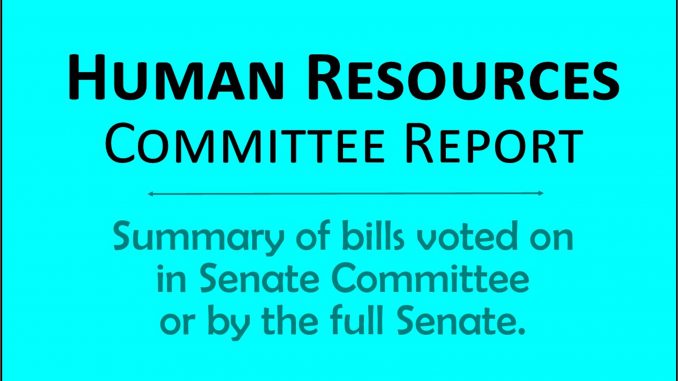
HF 291 – Medicaid spouse protected income
HF 304 – Personal degradation as “confirmed, not registered”
SF 348 Self-Administered Hormonal Contraceptives
HF 422 – Telehealth for CCUSO residents
HF 570 – HCBS Brain Injury cap
HF 642 – Sharing of information in human trafficking cases
SF 531 – Data registry on pediatric congenital heart surgery
COMMITTEE ACTION:
HF 291 – Medicaid spouse protected income
HF 291 raises the protected income that a spouse may retain when their partner is institutionalized from $24,000 to $25,284 to match federal law. Specific amounts are not spelled out in the bill, just the requirement to match federal regulations so new bills don’t have to be passed every time federal law changes.
[3/26: short form]
HF 304 – Personal degradation as “confirmed, not registered”
HF 304 is a technical change that allows dependent adult abuse “personal degradation” to be classified as “confirmed, not registered” to better match the severity of the crime. It expands current law that allows “confirmed, not registered” to this new offense that was created two years ago if the action is minor, isolated and unlikely to reoccur. Other allegations of dependent adult abuse that currently have the “confirmed, not registered” option are physical injury, unreasonable confinement, unreasonable punishment, assault and neglect of a dependent adult by a caretaker.
[3/26: short form]
SF 348 Self-Administered Hormonal Contraceptives
SF 348 uses a “standing order” to allow pharmacists to dispense an initial three-month supply and then a 12-month supply of self-administered hormonal contraceptives, including oral contraceptives, hormonal vaginal ring and hormonal patch. Patients must be 18 or over. Under the standing order, the pharmacist must complete a standardized training program and continuing education requirements; have the patient complete a self-screening risk assessment; provide written information to the patient; and provide patient counseling. After 24 months, the patient must attest that they have consulted with a practitioner. Insurance must pay for the three-month or 12-month supplies but not for replacing lost, stolen or destroyed meds. A dispensing fee is provided to pharmacists as well as limited liability protection.
[3/27: 42-6 (No: Behn, Carlin, Costello, Feenstra, Guth, Whiting; Excused: Breitbach, Nunn)]
HF 422 – Telehealth for CCUSO residents
HF 422 allows the University of Iowa to provide health services for patients at the Civil Commitment Unit for Sexual Offenders (CCUSO) via telehealth whenever it is deemed medically necessary. This may save CCUSO some travel expenses if they don’t have to drive residents to Iowa City for treatment.
[3/26: short form]
HF 570 – HCBS Brain Injury cap
HF 570 removes the monthly Medicaid cap for those on the brain injury home and community-based services (HCBS) waiver and requires the Iowa Department of Human Services to track the average amount expended per waiver recipient each fiscal year and report the information annually to the Governor and the Legislature by October 1.
[3/26: short form]
HF 642 – Sharing of information in human trafficking cases
HF 642 allows sharing of certain confidential information by the Iowa Department of Human Services to interdisciplinary teams. Currently, they can only share the information if the team is working on a child abuse investigation. This bill will allow information sharing in human trafficking cases when the interdisciplinary team’s sole focus is children in human trafficking cases.
[3/26: short form]
FLOOR ACTION:
SF 210 – Iowa CARE Act
SF 210 allows Iowans to designate a lay caregiver who will be given instructions to care for the patient upon discharge. The CARE Act has four main features: (1) Designate – The name of the family caregiver is recorded when a loved one is admitted into a hospital, if a patient chooses to designate one; (2) Notify – The designated family caregiver is notified when the patient is to be discharged back home; (3) Consult – The hospital discusses the caregiver’s abilities and limitations; (4) Instruct – The hospital discusses the patient’s care needs at home, and provides an explanation and live instruction of the medical tasks to be performed at home.
[3/26: 49-0 Excused: Breitbach]
SF 531 – Data registry on pediatric congenital heart surgery
SF 531 requires a licensed hospital that provides pediatric congenital heart surgery to participate in a qualified clinical data registry and provide information regarding how to access the national information during educational consultations with parents.
[3/21: 46-0 (Excused: Bisignano, Celsi, R. Taylor)]
